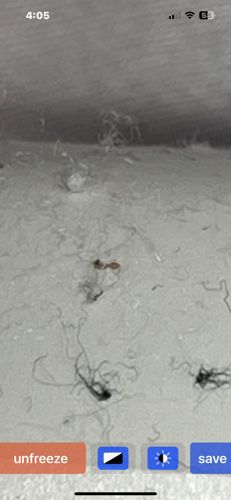Ant (likely a small species like Pharaoh ant or Argentine ant)
Scientific Name: Formicidae (family)
Order & Family: Hymenoptera, Formicidae
Size: 1.5 mm to 5 mm (for many common household species, larger for others)

Natural Habitat
Widely varied depending on species, including indoors in homes, under rocks, in soil, and decaying wood. The image suggests an indoor setting, possibly on a floor or surface with debris.
Diet & Feeding
Omnivorous; feed on sweets, starches, fats, protein, dead insects, and crumbs.
Behavior Patterns
Social insects living in colonies with a queen, workers, and males. Workers forage for food, create trails, and maintain the nest. Some species are notorious for invading homes in search of food and water.
Risks & Benefits
Risks: Can be a nuisance pest, contaminate food, and in some species, deliver painful stings (e.g., fire ants). They can be difficult to eradicate once established indoors. Benefits: Contribute to nutrient cycling in ecosystems, aerate soil, and can be predators of other insects.
Identified on: 11/16/2025